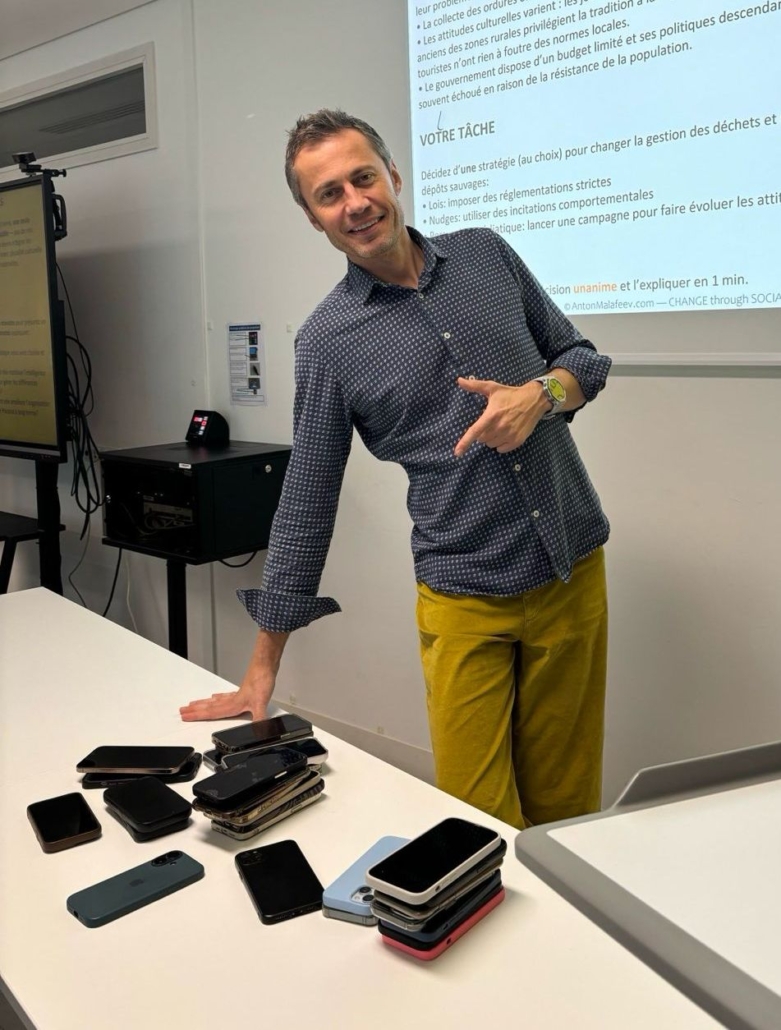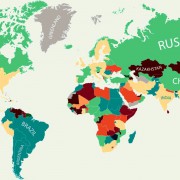Confiscation of phones at school?
Collecting students’ mobile phones at the start of each class is NOT an authoritarian gesture.
Today, it’s a pedagogical necessity.
Before every class, I ask my students to give me their phones — not to punish them, but to teach them two things. The first is the course itself. The second is that life without phones (with all the distractions we know so well) is not only possible but necessary. Especially at school.
I do this to restore a space of genuine attention, participation, and — dare I say it — mutual respect. Some of my colleagues react with disbelief: “No! You actually do that? Really?”. Well, yes… here’s the proof.

“And so? How do they react?”. Quite well, actually — believe me. For some, it almost becomes a game: after their breaks during the day, they drop off their phones on their own as they come back into class. Others make jokes about it: pretending to hand over their phones while clumsily hiding them in their pockets — they love being caught and scolded for cheating. The whole class laughs, the trickster first of all.
Even better. Many of them have confided (quite openly) that my rule changes everything. They listen better, participate more, and leave with the feeling that they have truly learned something. And on top of that, they discover that their classmates think differently from them on almost every topic I bring up.
Naturally, I let them keep their laptops and tablets — many take notes that way today, paper having become somewhat obsolete. Although some still think I can’t tell who’s actually taking notes and who’s chatting on WhatsApp or just surfing the web. Usually, it’s easy to spot — if only by their posture.
They also tend to answer every question and do their assignments with AI. For that too, I have effective and discouraging strategies. And at the end of the day, work done without AI, surprisingly, turns out to be much more effective — something they readily admit afterward. The main thing is to spell it all out for them in advance — like for blind kittens.
In the nut shell. It is essential now to return to the essentials — the human, the exchange, the act of thinking. It might sound empty, even politically correct. But those who teach will understand me. Because this is where we are: students send emails during class, look for internships, step outside to make phone calls whenever they want (because it’s “more important” than the lesson), compare cosmetics, and place orders on Amazon. And of course, that list of extracurricular activities is far from exhaustive.
In the end, nowadays, the best pedagogical innovation seems increasingly to be as simple as cutting the Wi-Fi.
Because the behavioral and intellectual decay of this new generation — oddly tolerated in schools today under the pretext of “individual freedoms” — can only be brought back to normal when limits are set.
My pedagogical (and, in a way, civic) resistance exists precisely to deliberately restore a space of focus and mutual respect. It doesn’t restrict any real freedom (for the duration of a class), but instead offers a more precious one: the freedom to understand and to learn — to transform passive consumers into sovereign citizens with a critical reasoning. After all, this is what determines the quality of our society — today and tomorrow.
You find that pompous? Then let me share just a few excerpts from written feedback I’ve received from students — only in the past month:
You managed to capture the attention of an entire class from 9 a.m. to 6 p.m., and that’s no small feat! (Very good idea, by the way, to collect the phones at the beginning of the class!).
The class was excellent. For once, I can honestly say it truly made me think — even after the session.
The teaching style was very engaging. Not having our phones with us made it easier to stay interested and to interact.
I want to thank you for giving us the opportunity to reflect on several interesting and meaningful topics this week. I can confidently say that my thoughts were challenged during this course, and the conversations we had encouraged me to reconsider certain perspectives and reshape my way of thinking.
I now find myself looking at things from a broader and more analytical perspective, and I appreciate the way your teaching challenged me to think critically and deeply.
We can really feel your motivation to help us understand and grow mentally. It’s so different from classes where most students are absent, late, or not listening to the teacher (myself included — because keeping our attention for several hours with a monotone lecture is a hard task, despite all the goodwill in the world!). So, please, keep sharing knowledge and pushing society to change!












